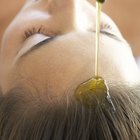
Thomas Northcut/Photodisc/Getty Images
Ingredients commonly found in shampoos that claim to aid in hair growth include various oils, pyrithione zinc and ketoconazole, and protein-enhancers. The presence of some of these ingredients doesn't guarantee results but if you're looking to help your hair grow faster, seeing one of those ingredients in your shampoo is a good start. At a minimum, simply applying hair growth shampoos with at-home scalp massages stimulates blood flow to the scalp which enhances the absorption of nutrients and the hair product. (ref 4)
Hair Oils for Hair Growth
Hair growth shampoos often include a variety of natural oils. Two oils that are proven effective through scientific studies include coconut oil and rosemary oil. According to the University of Maryland Medical Center, rosemary oil was used in a study of people who had alopecia areata and massaged their scalps every day for seven months with rosemary lavender, thyme, and cedarwood. The participants hair grew significantly more than those who didn't use oils. (ref 5) Coconut oil, another common oil found in hair growth shampoos, reduces protein loss in both undamaged and damaged hair and keep the scalp moisturized, which can prevent hair loss and breakage. (ref 1)
Amino Acids
Protein makes up nearly 90 percent of hair. Since hair is mostly of protein, it is common to see proteins and amino acids, the building blocks of protein, in hair growth formulas. (ref 7) Studies have proven some benefits to using amino acids topically to increase protein levels in the hair shaft,(ref 6) but protein is much more beneficial for hair growth when consumed as part of a nutritious diet. The body cannot produce enough hair fibers without an adequate supply of amino acids.
Vitamins for Hair Growth
Vitamin Pro B, or Biotin, is part of the vitamin B complex. It is a common ingredient in hair growth shampoos, as it is essential for hair health. Biotin deficiency can even cause hair loss, because the body relies upon it to metabolize amino acids, which supports hair growth. Taking an over-the-counter vitamin every day that contains vitamin B other antioxidant blends encourages hair growth. (ref 4) Other vitamins and herbs listed on hair growth shampoos are more likely to ease scalp irritations and improve hair quality rather than speed up or stimulate growth. (ref 2)
Pyrithione Zinc and Minoxidil
Multiple studies, including one conducted by Hill Top Research Inc., have demonstrated that using shampoos containing pyrithione zinc, encourages hair growth, making it a common ingredient in shampoos for hair growth. Ketoconazole, an antifungal ingredient in shampoos, helps hair growth by reducing inflammation on the scalp and improving hair density and size. It can also be used together with topical solutions containing minoxidil for enhanced results. (ref 3, 9)
Related Articles

Basil for Hair Growth

Vitamins for Damaged Hair

Chlorella and Hair Loss

Ingredients in Hairfinity Vitamins

Essential Enzymes for Hair Growth

How to Add Saw Palmetto to Your Shampoo

Benefits of Soybean Oil for Hair

Homemade Treatments to Make Hair Thicker

Can Any Supplements Help Control ...

How to Make a Homemade Water-Based Hair ...

How to Use Emu Oil on Hair

Does Borage Help with Thinning Hair?

How to Control Frizzy Hair for ...

Types of Hair Treatment

Does Copper Peptide Work for Hair ...

Can You Use Castor Oil for Psoriasis on ...

Arginine for Hair Growth

Can Apples Promote Hair Growth?

Oprah's Favorite Hair Products

Viviscal Ingredients
References
- NCBI: Effect of Mineral Oil, Sunflower Oil, and Coconut Oil on Prevention of Hair Damage
- EPA: Healthy Hair Care and the Environment
- NIH MedLine Plus: Minoxidil Topical
- Marieclaire: How to Make Your Hair Grow Faster
- University of Maryland Medical Center: Rosemary
- NIH MedLine Plus: Biotin
- NCBI: Hair and Amino Acids: The Interactions and the Effects
- University of South Carolina: Basic Structure of Hair
- Pilot Study of 15 Patients Receiving a New Treatment Regimen for Androgenic Alopecia: The Effects of Atopy on AGA
Writer Bio
Kristin Davis has been writing since 2004, specializing in the health and fitness fields. She has written for online and print publications including Fitness Monthly and Creative Circle. Davis has certification through the International Fitness Professionals Association as a personal trainer.
Photo Credits
Thomas Northcut/Photodisc/Getty Images